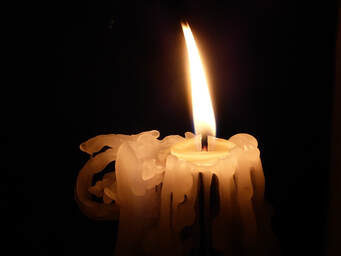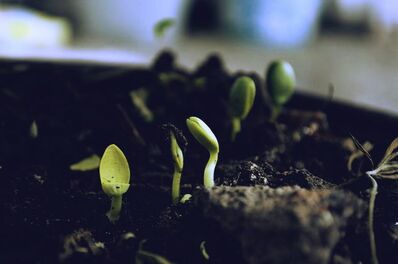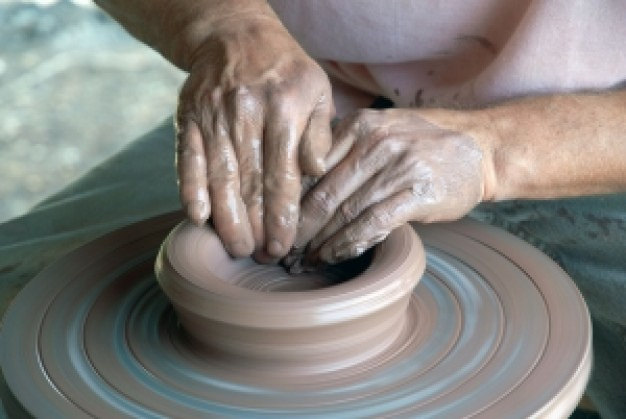|
This video essay explores making art and the resurfacing of old loves as we connect with each other and ourselves through pandemic isolation. It references the *National Geographic* article "The pandemic is giving people vivid, unusual dreams. Here’s why." by Rebecca Renner published on 4/15/2020 on NationalGeographic dot com.
1 Comment
Exploring the importance of reflecting on who we are before we decide what normal we want, and also some of my own reflections on questions vs. answers in my creative process.
I'm seeing, and reposting, a lot of people's conviction that this pandemic presents us with an opportunity to reconsider normal. Many people are rightly calling for us to assess our moral, economic, and political systems as this COVID-19 plague exposes where we have failed each other and ourselves.
But I'm not seeing a whole lot of suggestions for what the new normal might look like. Knowing that the normal we have does not work - this is like knowing we need to build a bridge to get across tough landscape. We can know all day long, but without planning, preparing, and building, knowledge won't be enough to get us to the other side. So. I invite us all to consider: What could we change? We may think of this at any scale and be doing good. It can be: What can I change in myself so that I live more consistently with what I feel is my purpose? Or: What can we change as a household to live in a way that more deeply appreciates what we have and builds on what's important to our family? Or: What collective change would fill the gaps we've seen in our neighborhood, town, state, nation? We don't have to think of everything at once. We don't have to all work at all scales. And we'll have some ideas that, in the long term, we may let go or replace with others. But if we just know that we need a new normal, and do nothing to prepare one, we will emerge into a more broken version of our old normal, and walk around dissatisfied and disillusioned. One change that makes sense to me in this moment is an annual Week of Remembrance to keep us connected to all we're learning now about valuing each other, about healing the damage we've done to the planet. It doesn't solve everything. In order for it to work, we'd need to build stronger protections against domestic violence, against the real effects of poverty, against racism. I don't have fixes for all of those things, but if each of us takes the time to start envisioning the specifics of our new normal, perhaps by the time we emerge from this sickness, those solutions, or their beginnings, will emerge, too. Think on them. Write them out. Be specific. An Annual Week of Remembrance In the quiet, we resign ourselves to our houses. We park the cars, shut down the factories, and walk inside for our Week of Remembrance. In this week, we do not drive to restaurants. We do not manufacture toys or go to salons or fight legal battles. We rest. We remember. We remember what we lost, and what we gained. We play board games and binge Netflix with our children, fully aware of how fragile they are, how lucky we are to have them, and they to have us. We mourn our dead - those who passed alone, those we could not gather to remember for fear we'd be struck down next. We take walks and cry and have happy hours with friends on our computer monitors. We let the earth rest. We give her a week of clear skies, and she gives us views of the Himalayas, hordes of sea turtle eggs on the beach. We breathe and let breathe, knowing what a gift it is to have lungs that open and to fill them with air that's safe. We thank our Gods and hold them to account, and humble ourselves, and hold ourselves to account. We rest. We remember. We look the heaviness, the weariness in the face, and let it melt under a wizened sun.
Welcome to my first video blog. I'd planned to discuss the research behind my recent publication, "That Which was Fine and Free," in the anthology Legends Reborn. But the global pandemic we're facing felt more important than my research process. So, instead, I talked about something our current situation has in common with my story: collective fear in an upended world, and dealing with our personal fears. I hope you find encouragement here.
(Bonus material: If you listen closely, you can hear my daughter practicing tuba in the other room.) Stories start as a scratching, a tapping, a dripping faucet - something that niggles at us as we go about our day like a shadow that keeps shifting in our periphery. At least, this is how they start for me, and for most of the authors and writing students who've shared their processes with me. Something, whether beautiful or problematic or curious, will not leave us alone.
So we turn our heads. We look in the direction of the shifting shadow and see a bit of a shape to it, and we write down what we see. Sometimes this leads to the next thing and the next thing. Those times are gifts, when the story reveals itself to us in full, continuously, as we sit with it and open ourselves to the words that bring it into the world. Most times, we have fits and starts. The scratching creature gets skittish and scurries away the moment we've turned our attention toward it. We have a line or two, a page or two, and don't know where the little beast went or how to follow. We look for its tracks in the rooms and landscapes of our minds, and along the way, we see what it saw as it ran. Sometimes, we find it that same hour we started searching. Other times, it takes weeks, months, or even years. There are traces of story that started in me over 20 years ago, back when I was in high school, and I'm only now picking up their footprints. In the time since they first tickled at the edge of my conscious to now, I've written many, many other stories. And even in these, I've come to dead ends and missing trails at different moments along the journey. Some of us call this writer's block. I have come to think of it as not being ready for the story, or for the particular part of the story, that we're writing. Stories are one of our most ancient containers for truth. When we didn't understand nature, or cruelty, or love, or time, we made myths to contain these truths so we could hold them up to the light and examine them outside ourselves. This helps us navigate the complexities of our own experience. But what if a story has a truth to tell that we don't yet know ourselves, as its writer? Here are some things we can do when we realize our story has outrun us:
What about you? Do you have other strategies for making yourself ready for the story that wants to be told? I am planting. I've added golden dewdrops (the flowers are purple - go figure), purslane, Texas sage (not edible), to the back yard. Really, it's just a patio, but it's open to a large green space with a view of trees and the dilapidated golf course that stretches through my neighborhood. In the front, I've decided I'm up for a challenge, and planted gardenias. My husband's grandmother used to grow them, and he misses the smell. He lost his eyesight in 2016, so there's some significance to this. I also added an orchid because my friend Dawn says they're ridiculously easy, and I want something pretty out there if it turns out I'm not ready to level up to the high demands of gardenia bushes.
I am planting. I started teaching screenwriting in December, and so I am writing screenplays now. Short ones. I've written a few scripts before, but now I need to pull them into my wheelhouse rather than treating them as side adventures. Over the past three weeks, I collaborated with a colleague to write an 8-page script that we hope the film department will produce for the festival circuit. I am sending out my most polished novel to agents, and I am writing short things - poems, flash, threads of story for a novel with an ensemble cast. The soil is fertile now, but it's been a long winter for us - three years of increasingly fallow living as we journeyed through my husband's illness. He has Type 2 diabetes, and a year after losing his eyesight, he lost his kidney function. Everything extra fell away from our lives, along with some of the essentials. Our weekend adventures - we used to take meandering road trips. Living in our downtown home - we have moved to a suburban townhouse. My daughter - she moved in with her dad when the stress of living with terminal illness affected her too deeply to stay. Some losses have measurable value. Others spread their bleeding emptiness through every layer of our being. In January, we were blessed by a generous friend who gave Felix a kidney. While this hasn't brought back his eyesight, it's stabilized everything else. Felix is healthy and beginning to enjoy cooking and small adventures again. He and my daughter have laughed together a handful of times this year. Without the 3-7 weekly medical visits involved in kidney failure, or the 30-mile drive (120 miles for two round trips daily) to and from my daughter's magnet school, I am left with time. And a heap of compost. Dead things that have collected in my soul over the past three years. Sometimes, the smell overwhelms me, and I lay in bed and cry at all the loss. But on good days, I sew handfuls of my decomposed life into the soil, and I write, and I wait for the gardenias to bloom. It’s been a year since my husband’s kidneys failed. I was prepping the conference room at HD Counseling for a painting workshop. People would start arriving in about ten minutes. My phone rang, and our friend Jen told me that Felix was waiting on an ambulance. They’d been seeing a movie, and he couldn’t breathe.
It was so close to the start time that people would already be on their way to my workshop. I wouldn’t be able to cancel until everyone had arrived. Jen passed the phone to Felix. He didn’t want me to cancel. Jen promised to give me updates, and I promised I would meet them in hospital immediately after the workshop was done, sooner if he needed me. For the next three hours, I served coffee and tea and painted with a roomful of lovely humans who were ready to pack up at any moment if Felix took a turn for the worse, and ready to keep me laughing and enjoying the process of creating for as long as he did not. After cleaning up, I stopped by the house and grabbed the hospital essentials - toiletries for both of us and a week’s worth of strategically interchangeable outfits for me. My husband is newly blind. I don’t leave him alone in hospital. I followed Jen’s final text to his room number. Thanks to the painting session, I’d never been more at peace on my way to an emergency. Over the twelve months since then, the shape of our lives has continued to change, funneling through dialysis clinics, our daughter’s high school programs and the very real needs that can push a teenager toward a confident adulthood or lifelong insecurity, moving house in order to nail down a more constant budget, the erosion of my stepdad's memories, the odd circumstances of the death of my Aunt Sandy, health issues in our extended family, issues with my own health, seismic changes in family structure. It’s been a cataclysmic year for us. I am worn down to my threads. I peck at a chapter here, a painting there. I forget thumb drives when I go on writing retreats, research themes too big for me (but that are somehow easier than sitting in the mottled present tense of what is my real life). I find myself drifting. Longing for beauty. And this is why we need art. This is why we need story. This weekend, my despair was so great I couldn’t sit alone. My husband was so exhausted from having his blood artificially cleaned and pumped back into him that he had no energy to distract me. So I gobbled up What Alice Forgot by Liane Moriarty. Someone had mentioned it after they asked what my novel, The Former Lives of Buildings, was about. My protagonist, Like Moriarty's, wakes in the hospital having forgotten important events. I intentionally waited until my own book was finished before reading Moriarty’s (I’m currently shopping TFLoB around to agents). Alice's forgotten years helped me forget my losses for a day. Last week, I spent some listless time walking around Adjectives Market, a co-op type shop filled with vintage, upcycled, and original ephemera. Sometimes, when I can’t stand being in my own head, I think about which room I’ll paint next in our new place. I’ve temporarily stopped offering workshops. I haven’t hosted Artist’s Way groups in months. I am still hosting my writing circle because I don’t think I will survive these waves of loss without the collective writing experience for a few hours a month. But otherwise, I have let go of most of the peopling part of my art life. But the part where I get to leave my life for a moment by living in the head of someone else - whether it’s my character or another author’s, the part where the overlap of red oil paint just past the edge of the white strokes of a bird’s feather, even the capture of real forget-me-nots in a drop of glass on Etsy - these quiet offerings of beauty keep me breathing, in, out. They ask nothing of me across a year that has already stolen far too much. Beauty asks nothing. It just exists alongside all the ugly and lets us notice it, or not. Make art. We all need to breathe. After taking a long break from blogging to finish out my time teaching in public school, I'm excited to revive my blog 100 Pots. I'll be adding new posts and reblogging some of my older ones. Here's my very first post, and the origins of my blog title. Enjoy! A thousand years ago when I was an undergraduate student at New College of Florida, I had a quirky ceramics professor who lived in my backyard. The house I was renting with some other students had a guest house, and one day Bob and his wife showed up and moved in. Bob smoked cigars that gave of a mellow, spicy scent and did not let me into his 3-D design class, but asked me to join his ceramics class. I think it was an olive branch to be neighborly more than anything else. The design class had so much more to do with my work, and so many fewer seats than the ceramics class. I was mad, but, after all, he was my neighbor, so I accepted the invitation. It turned out to be my most memorable college class. Bob gave his students the key code to the building, and a few of us would be there at all hours of the night. And he would be, too. We'd let the slippery clay spin between our fingers, rising, falling, a meditation. Then, if Bob was there, we'd join him outside for a break while thick cigar smoke fogged the night air between us. We learned how Peter Voulkos would turn a perfect plate and then slice it with wire and patch it back together, leaving messy cracks and sensual textures. We learned about Paul Soldner's collaging clay together until it could be nothing but art, not a craft, not a cup you would drink from or a bowl you would eat from. Their work demanded new esteem for clay. Their work concentrated on the beauty of the flaw. The beauty of the flaw translates to all art. If a writer writes a perfect character, it better be a villain because nobody wants to root for a perfect person. We love the underdog, the broken, the tragic flaw. In one of our class meetings, Bob told us about a professor he'd once had. The professor divided the class into two groups. The first group had to make 100 pots. Over the course of a semester that's about seven pots a week. That's a LOT of pots. But the number was the only requirement. The pots could be any size or shape, symmetrical or lumpy, it didn't matter. If they made their hundred, the members of this group would receive A's. The second group had the entire semester to make only one pot. But the pot had to be perfect, flawless, without fingerprint, wabble, variation in wall thickness, or any other mark that a human being had anything to do with it. If they turned in one perfect pot, the members of this group would receive A's. Guess which group came closest to making the perfect pot? So I'm writing my first blog post about the phrase that keeps me moving forward with my work when I'm afraid it won't come out perfectly. I hear it in my head, in Bob's lively, round-voweled voice: "100 Pots! 100 Pots!" They will never be perfect, these words, but the more of them I write, the closer they will get. Bob was right. The ceramics class was exactly what I needed. Image: Credit. Attribution-ShareAlike License. |
100 Pots
Welcome to my blog, Archives
May 2020
Categories
All
|






 RSS Feed
RSS Feed